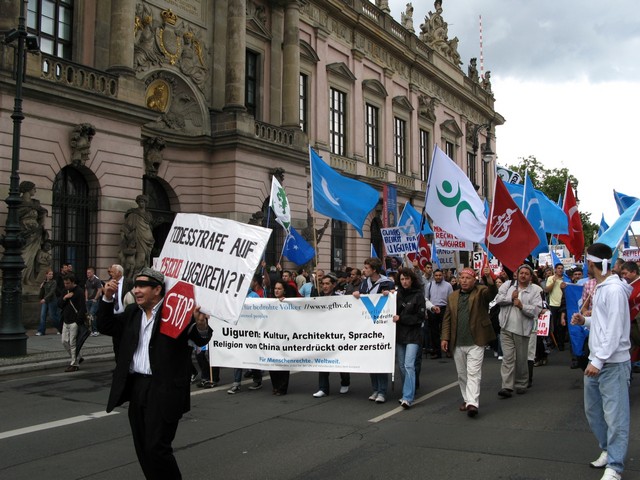By Abdullah Al-Ahsan
The Turkish daily Hürriyet has reported that, “World Uighur Congress (WUC) head Rebiya Kadeer has criticized Chinese oppression of the Uighur Turks living in China’s northwestern region of Xinjiang, saying that massacres, extrajudicial executions and oppression against Uighurs was continuing (July 8).” Earlier protesters in Turkey have demonstrated in support of Uighur minorities in against alleged Chinese persecution of the minority community. Some extremists have even attacked South Korean tourists by mistake thinking that they were Chinese tourists and some opposition politicians blatantly expressed their support for violent acts. In fact since the beginning of the holy month of Ramadan news about the persecution of Uighur Muslims in Southern China are making headlines in many parts of the Muslim world. If I remember correctly, we had witnessed the similar news during Ramadan last year as well.
Is this just a coincidence? Is there anything new in the Uighur situation? Why is such a flurry of this information now? These questions should be examined carefully. In analyzing the accusation of WUC head Rebiya Kadeer one news agency has reported that, “The heavy security measures are part of daily life. Armed security forces guard many corners. It is not possible to freely take a photo due to the security forces. Moreover, people are also hesitant to be in photos or videos (Daily Sabah, July 8).” But is this happening only in Xingjian? Or this is the first time that such events are taking place in the region? Aren’t other regions of China also subject to similar restrictions? Who wouldn’t object to “massacres, extrajudicial executions and oppression” of minorities? But aren’t Muslims victim of such persecutions in Muslim majority countries such as Bangladesh and Egypt? Shouldn’t one fix his/ her own house before finger pointing to others?
Role of the International Media
Interestingly the international media seem more interested in stories of persecution of Muslim activists in Xingjian than in Bangladesh or Egypt. In a feature entitled “Why is there tension between China and the Uighurs?” BBC (September 26, 2014) explained how the crisis originated and how the rights of self-determination of the Uighur community are being denied by the Chinese authorities. Right groups such as Human Rights Watch (HRW), Amnesty International (AI) also have been reporting about the abuse of Uighur Muslims and how they have been denied of their fundamental right including their nationhood in our world of nations today. While one must appreciate these concerns, one must also contemplate on the nature and timings of these features and reports. Are all such reports well-intended? Are the Uighur only people who have been denied independent nationhood in the world today? Why don’t the Kurds have a state of their own? Was China responsible for it or the British? One would find many more examples of su
ch denials in the history of world affairs. How then should one address such issues?
Uighur Issue in the Context of the Clash of Civilizations Thesis
Like all other similar issues the question of Uighur persecution is a sensitive one. In a world mired by the clash of civilizations thesis this, in fact, is a super-sensitive issue. Formulator of the thesis, Samuel Huntington, had warned against possible Chinese-Muslim cooperation against what he called the Western civilization. Is there a hidden agenda behind these reports? Are some spy agencies and prejudiced think-tanks trying to exploit the Uighur situation in order to create distance between the Chinese authorities and the Muslims? There are plenty of evidences of such manipulations in world affairs. Shouldn’t Muslims be carefully examining to find out whether they are being intimidated by the story of Uighur persecution particularly during the holy fasting month?
Records would demonstrate that China has been more careful in handling minorities than many other countries. Compare the Indian treatment of people of Kashmir. The “world’s largest democracy” Indian government has refused to sit with the Organization of Islamic Cooperation (OIC) to discuss the Kashmir issue arguing that the issue was one of India’s internal one, while the communist China has welcomed the OIC to discuss the Uighur issue. For decades China has sought assistance OIC member state Pakistan in facilitating Chinese Muslims to perform the annual Hajj.
The Need for Muslim Reconsideration of the Issue
In fact the international Muslim community should also consider and compare the treatment of Uighur and Hui Muslim communities in China. In terms of the number, both communities are almost the same: about 10 or 11 million people in official figures, but the Huis are scattered all over China as opposed to the Uighurs who inhabit in the south of the country. And the Huis are reported to be doing generally well with China’s opening of business with the outside world.
History has demonstrated that dialogues have produced better outcome than violence in resolving conflicts. The Turkish leader Recep Tayyip Erdugan officially visited Urumqi as prime minister in April 2012 and he is scheduled to visit again as president soon. Through dialogue create opportunities for the Uighur youth for education, provide them with scholarship, and create hope for the future. This will boost their confidence and they should be able to positive growth of the Chinese economy. Perhaps it would be wise on the part of the Turkish leader to include a representative of the OIC in his delegation. This will help gaining the confidence of the international Muslim community in overall efforts to reduce tension.
Professor Abdullah Al-Ahsan is a historian and Vice-President of the International Movement for a Just World (JUST).
14 July 2015

